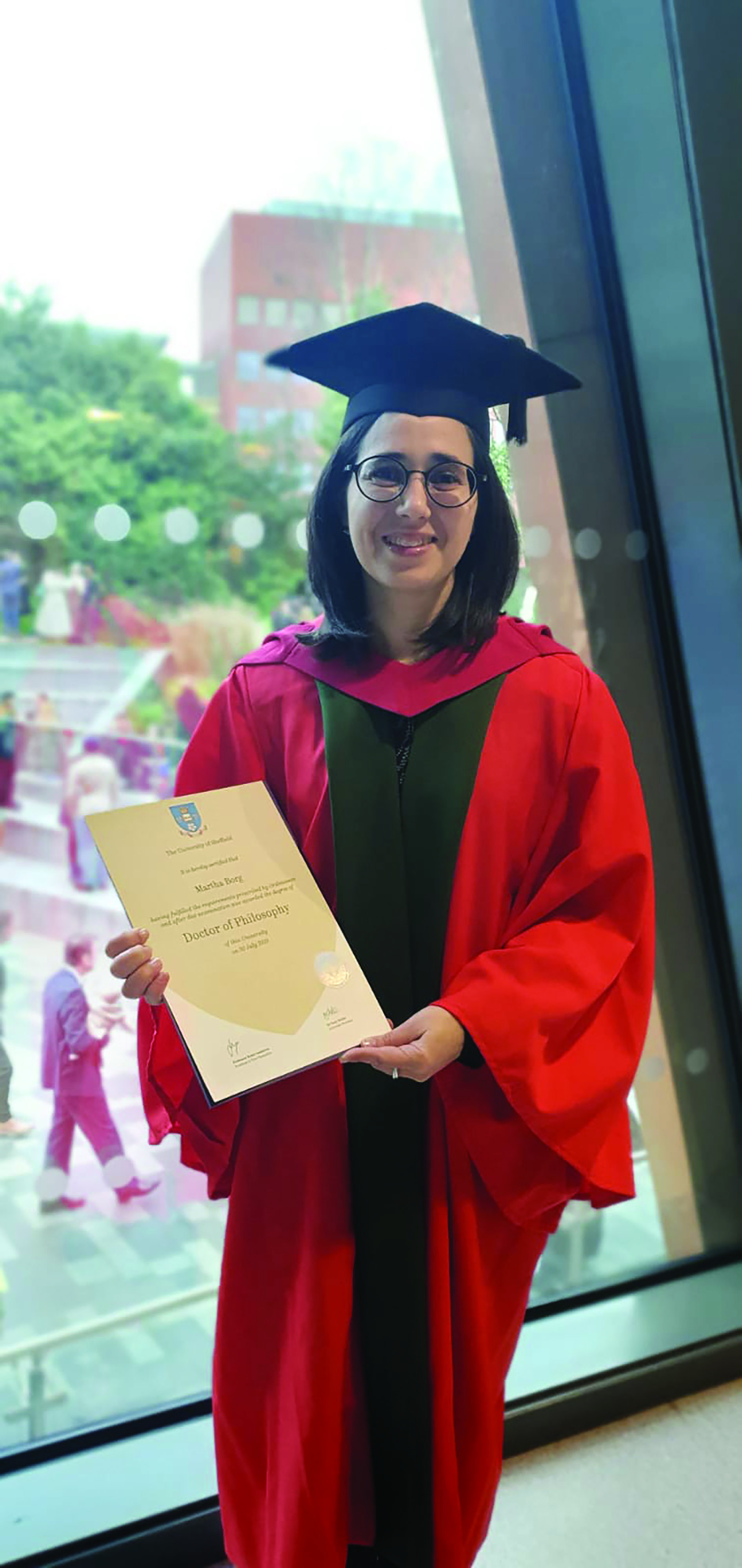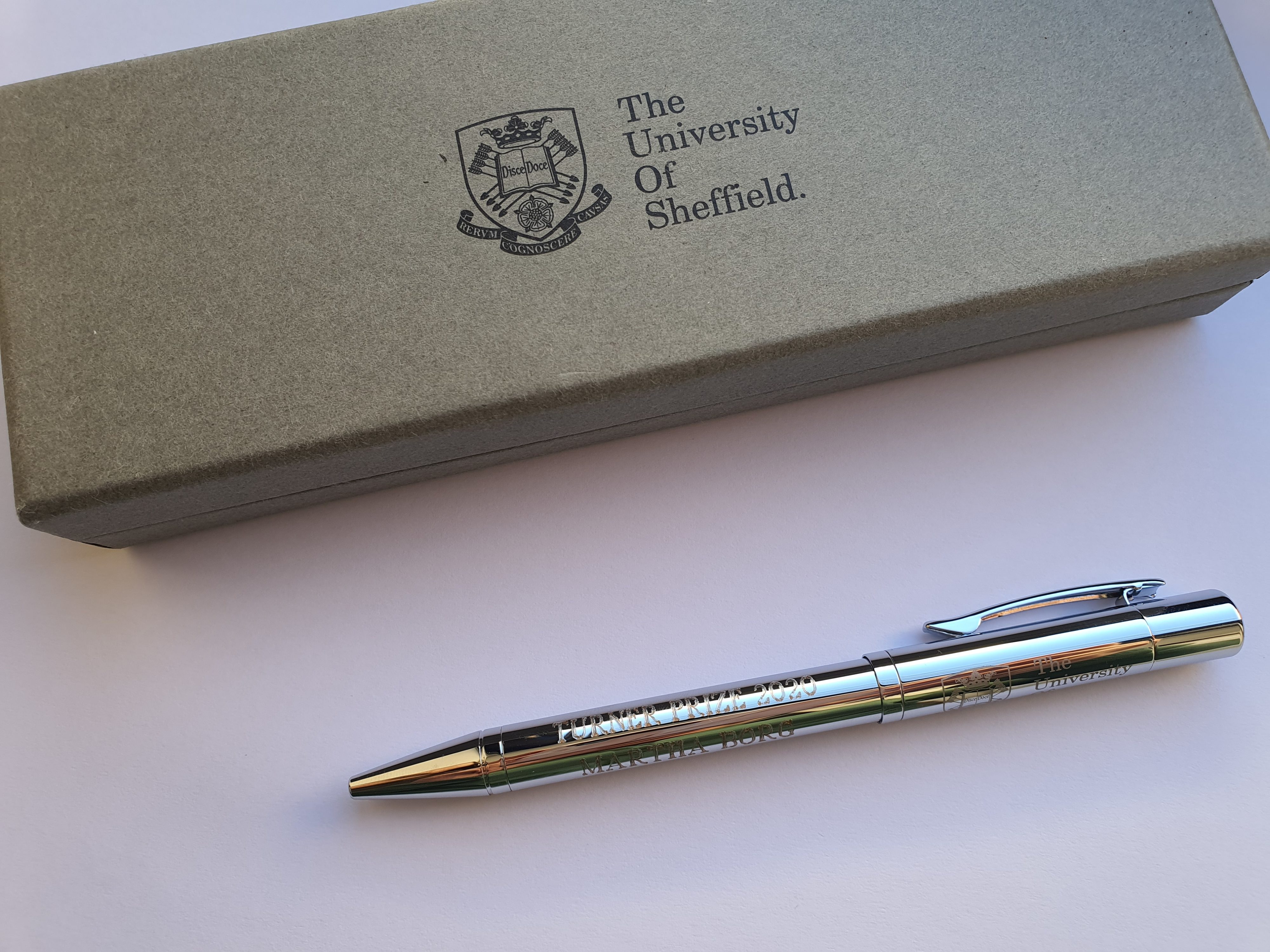Though she did not take the easiest path, a desire for new knowledge and the application of mathematics in complex problems has led Dr Martha Borg to critical acclaim in the field of theoretical chemistry. Here she tells Becky Catrin Jones how she fought through many challenges to achieve her goals.
‘Mathematics has always been my passion’, the new Dr Martha Borg tells me as we sit down to discuss over video chat.
Although ultimately she has gained a doctorate in theoretical chemistry, Martha is quick to point out that her journey didn’t start there. She attended the University of Malta (UM) to study a BSc in Maths & Physics in 2007, with her focus firmly on the mathematics side. But during this time, exposed to different subjects, fields, and guest lectures, she saw how maths was so easily connected to many other exciting fields. The way maths is applied to other problems is what really excited her.
Having completed her degree, Martha went straight back to complete a postgraduate certificate in education (PGCE) and started teaching maths and physics at a local high school. ‘Teaching is something that I like to do,’ Martha says. ‘It helps you appreciate your subject more.’
While Martha speaks very fondly of her teaching, this was not her dream career. Her passion for academia and the pursuit of knowledge was much stronger. It was no surprise then that, after two years of teaching, Martha returned to the Faculty of Mathematics at UM to work towards a Master’s degree.
Making the maths work
It was during this time that Martha was introduced to Professor Irene Sciriha, a UM professor particularly interested in graph spectra theory. This was to become Martha’s study focus.
Martha used our video chat as an example of graph spectra theory. She asks me to imagine that we are two points in space – or vertices. We are connected, on the video call, by millions of internet connections – or edges. Together, this makes the graph. And from there, you can explore all possible connections and links between them.
Graph theory is a basic mathematical theory that is very easily applied to other fields. Martha’s work took advantage of this principle to investigate whether single particles might act as conductors or insulators of electricity.In time, this work might revolutionise batteries and electrical devices. What if, instead of a battery, we could use a single particle to power our phones?
Next steps
With a master’s degree under her belt, Martha turned her focus back to teaching while she worked out what exactly she wanted to study next. Although the interest was clear, she needed a solid project plan to be able to progress further. ‘I wasn’t sure what I wanted to do. I needed to find a suitable research question.’
It took Martha a couple of years to decide on a subject that made it worth returning to academia. She pitched her idea, an expansion on her master’s project identifying potential conductive particles, to Sciriha, who, despite being enthusiastic about the project, had some reservations around whether she was the right person to lead her through the degree.
‘Professor Sciriha was worried that by the time I was finishing the PhD, she may have retired from her post,’ Martha explains. Having already had a long and illustrious career in research and academia, Sciriha was considering retirement and did not want to leave her without a supervisor, so she politely declined.
This was a big problem. Having taken such time to develop a research question that Martha really wanted to pursue, it seemed that it might not be possible. After all, Sciriha was the only active researcher in Malta with an interest in that field – where else could she go?
Luckily, Sciriha had another idea.
‘Professor Sciriha had some very good links with Professor Patrick Fowler at the University of Sheffield,’ says Martha. A collaborator of Sciriha, Fowler was an established name in theoretical chemistry and a fellow of the Royal Society, a prestigious title assigned to those who excel in their field. Sciriha passed on his contact details and her support. Martha then reached out to the UK professor.
‘I contacted him with my humble idea, and he said he would be very happy to take me on as his research student!’ And so, in 2013 Martha started reading towards her doctorate.

Working out the difficulties
But not before a few more hurdles had to be overcome. ‘It would have been ideal to give up teaching and instead focus on my studies, but there was a bit of a funding issue.’ At the time, Martha found it difficult to find funding schemes that applied to her and her more abstract research, so she would have to fund herself – university fees, flights, accommodation, and all. She would need to keep working full-time at the high school to support herself.
Such was her drive to continue in research and her passion for the project that, despite all the difficulties, Martha decided she was willing to work to pursue her career in academia. She accepted the offer of a part-time, long-distance PhD with the University of Sheffield, knowing she would spend little time in Sheffield.
‘In fact, the University of Sheffield had never taken on a candidate like me before.’ Martha’s long-distance learning meant that she was unable to do most of the things her peers would take for granted: a chat about a problem with a colleague over coffee, attending a guest lecture from a travelling scientist, or even daily communication with a tutor to discuss both small and complex problems that arise when delving into the unknown.
Martha had to make things work for her. Although she missed out on the activity at the Chemistry department in Sheffield, she had an agreement with UM that she could attend relevant lectures there instead. Weekly meetings with Sciriha kept her research on track and anchored to the world of academia. Sheffield even agreed to reproduce some of their learning modules online for her benefit.
An understanding head of school gave Martha much needed flexibility, giving her permission to leave her teaching job on some Friday afternoons to visit Sheffield and work on her PhD. During these precious times she had to make the most of Fowler’s guidance and experience. ‘I spent the whole time I was in Sheffield by Professor Fowler’s side – from 9am in the morning till about 7pm at night on a daily basis!’
The power of a good mentor
Although the circumstances by which she undertook her PhD were far from ideal, Martha is truly grateful and humble about the whole experience. ‘I really have nothing to complain about,’ she says often, offering it almost as punctuation between the numerous challenges she faced. ‘I am grateful to have had good mentors, backing from different people who have kept me pushing.’
It’s clear from our conversation how much of an impact Sciriha in particular has had on Martha’s career. Finding a mentor to guide and encourage her has made a difficult journey seem possible, knowing she had someone in Malta to turn to for advice.
And thanks to this support, Martha completed her doctorate a whole year earlier than planned. After completing her viva successfully and achieving her title of Dr Martha Borg, she was granted one more, unexpected accolade.

The UK Turner Prize, in memory of the late chemistry professor William Turner, is awarded to four PhD students annually who have produced an outstanding thesis. Impressing her examiners, Martha was given the honour of receiving the title this year, alongside a £50 financial prize and a commemorative ballpoint pen. ‘It was nice to get the recognition, and to come full circle,’ she says with a smile, pointing out that Fowler himself had once been the recipient of the award.
Looking forward
Martha has returned to teaching for the time being but is keeping her eyes peeled for her next opportunity to get back into research, whether that be in Malta or abroad. ‘The application of maths is what really excites me – I want to be a bridge between the different sciences’.
Despite the challenges she faced while earning her PhD, Martha would still wholeheartedly recommend others to do the same. ‘If you have the passion, don’t stop at the first closed door.’ The opportunities are there if you keep searching, and Martha has no intention of stopping.
Author
-
Becky Catrin Jones is a freelance writer and science communicator based in London, UK. After completing her PhD in cell biology, she moved away from academia and into communication to spend more time talking about and sharing science. Becky has written for THINK since 2017, and managed a number of other blogs including for the international Pint of Science festival. Although biomedical research is a topic close to her heart, she is excited about all areas of research, and has written on subjects from cheese to concrete.
View all posts





Comments are closed for this article!